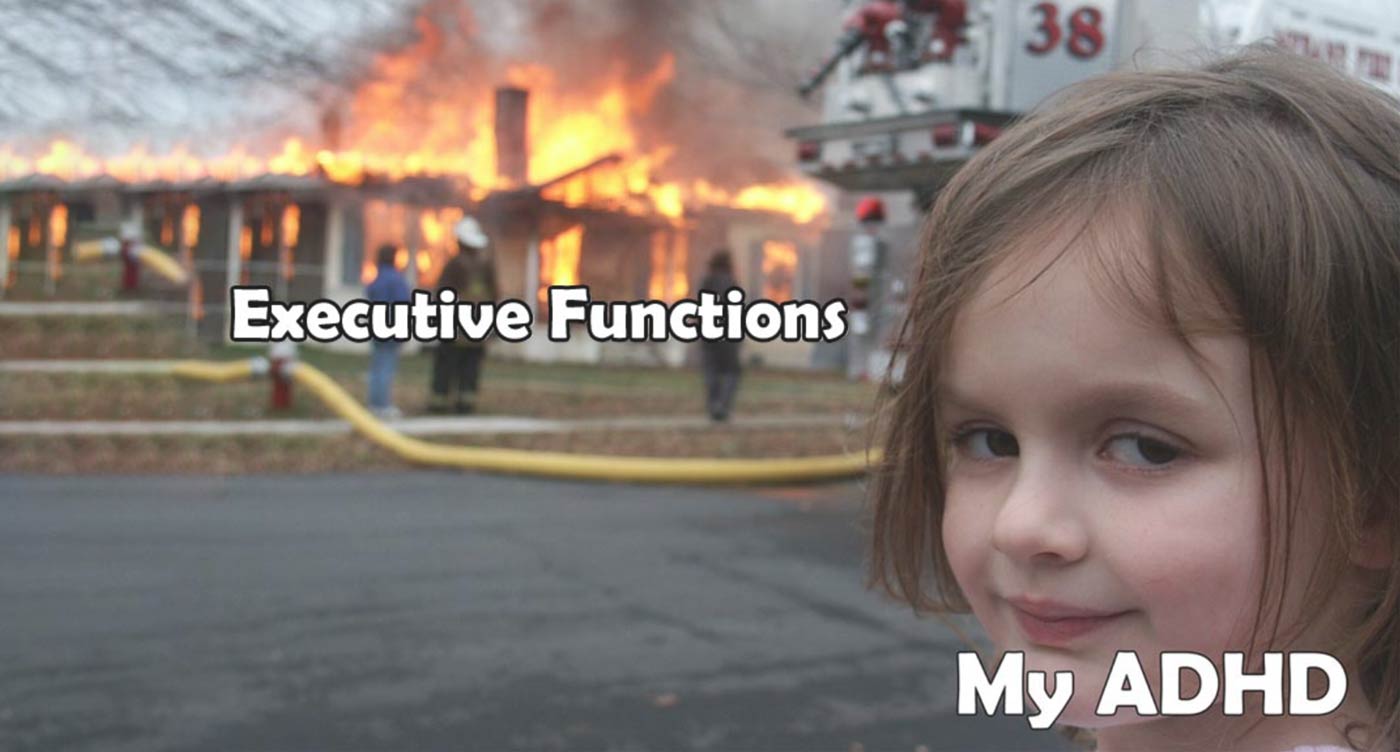Let’s look at what “executive functions” are and why they matter—and why our ADHD brains constantly make them impossible to use!
Working With Your Brain, Not Against It
If you’d like to learn more about the window of tolerance and its positive effect on understanding ADHD, check out this connected article: Open Window, Open Mind: ADHD and Understanding Your Window of Tolerance. Some of the terms I use in this article are defined there.
In this article, I’ll explain what “executive functions” are, why you need them, and how your ADHD brain can make using them troublesome.
Have you ever sat down to start a project, and suddenly found yourself cleaning the fridge? How many times have you made an ambitious to-do list for the day, and then felt frozen and paralyzed, unable to complete a single thing? How many times have you left your clothes sitting in the dryer, because folding them felt more painful than watching paint dry?
These are experiences that—as a fellow ADHDer—I know all too well, and—as a therapist—understand the underlying cause of: a deficit in executive functions! (Likely caused by your window of tolerance slamming shut.)
That’s right—you’re not lazy, you’re not distracted, and you’re not a complete airhead! It’s more like you’re trying to land a dozen airplanes, but there are too many mixed signals on the runway.
What Are Executive Functions?
Executive functions are a set of mental skills that manage complex everyday tasks, by allowing you to do things like plan, organize, pay attention, switch tasks, and self-regulate.
You know when you’re looking out the window at the airport and you see the air traffic ground crew, dressed up in funny bright yellow suits and feverishly waving around light-up sticks? They work with control to coordinate and direct the planes, making sure departures depart, arrivals arrive, and everyone gets where they’re supposed to go (without clipping a wing).
We can think of executive functions as the air traffic ground crew of our lives. They coordinate our actions, ideally making everything seamlessly fit together. But sometimes, when our window of tolerance is slammed shut and we have no access to our executive functions, it can feel like the ground crew fell asleep at the job and now the entire airport is on fire and everyone is running around in sheer panic.

Are you starting to get the picture of how dysfunctional executive dysfunction can be?
Examples of Executive Functions
The following skills are a non-exhaustive list of some executive function skills that are relevant to every human:
- Working memory (short-term memory)
- Impulse control
- Sustained attention (focus)
- Starting a task
- Switching from one task to another
- Planning / prioritizing (thinking ahead)
- Organization
- Self-monitoring
- Time management
- Sustained effort (Defining and achieving goals)
- Cognitive flexibility (Seeing things from different angles)
- Emotion regulation (Feeling your feelings and regulating them)
When your window of tolerance is open and you are optimally aroused, you have a much easier time accessing your executive functions. That’s not to say they will be perfect 100% of the time, but it does mean you can navigate the ups and downs of life effectively.
When that window is closed (or worse, slammed shut!) and you are either hypo- or hyperaroused, it becomes nearly impossible for you to access, let alone use, your executive functions. Like the ground crew put up a “Back in 15 Minutes” sign and abandoned the airport, while you’re out on the tarmac still trying to land flight-615: order dinner.
Learn to Work with Your Brain
So no, this isn’t about laziness! This isn’t about incompetence! This is about how your brain processes information and manages its energy output—and how you two aren’t working together.
Think of it like being at the airport when your flight gets delayed: you don’t scream at the ground crew to make the plane take off faster. You look for ways to pass the time, maybe grab a snack or take a walk. Executive functions are the same way. When your brain’s “flight” isn’t ready to take off, you can either beat yourself up at the gate—or you can align with the reality of what your nervous system is signaling, and work with it instead. Afterall, you can’t hate yourself into changing! The sooner you stop fighting your brain and instead start working with your brain, the better.
In therapy, it’s possible to learn strategies that work with your unique brain, like the window of tolerance lens. You learn to support your executive functioning, instead of berating yourself every time you can’t muster up the desire to fold your damn laundry. (No, I will not be taking questions about the contents of my dryer at this exact moment, thank you.) When we understand that our struggles as neurodivergent brains are not character flaws, but rather neurological roadblocks, self-compassion can flourish.
The next time you feel stuck, instead of asking what on Earth is wrong with me?!, try asking “Which executive functions might need more support right now?” That shift alone can open new doors of self-understanding (and get your clothes out of the dryer).
If you have ADHD and want to learn more about your executive functions and how to support them, reach out for a free consultation today.
Rebecca is accepting new clients.
Schedule a Free 15 Minute Call with Rebecca. You can also jump straight into a first session if you’re ready.









